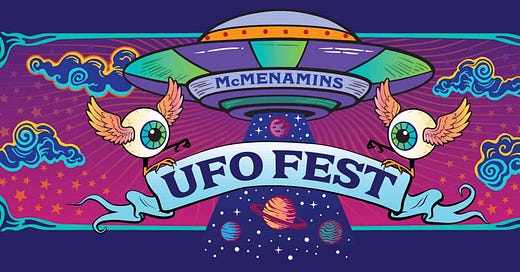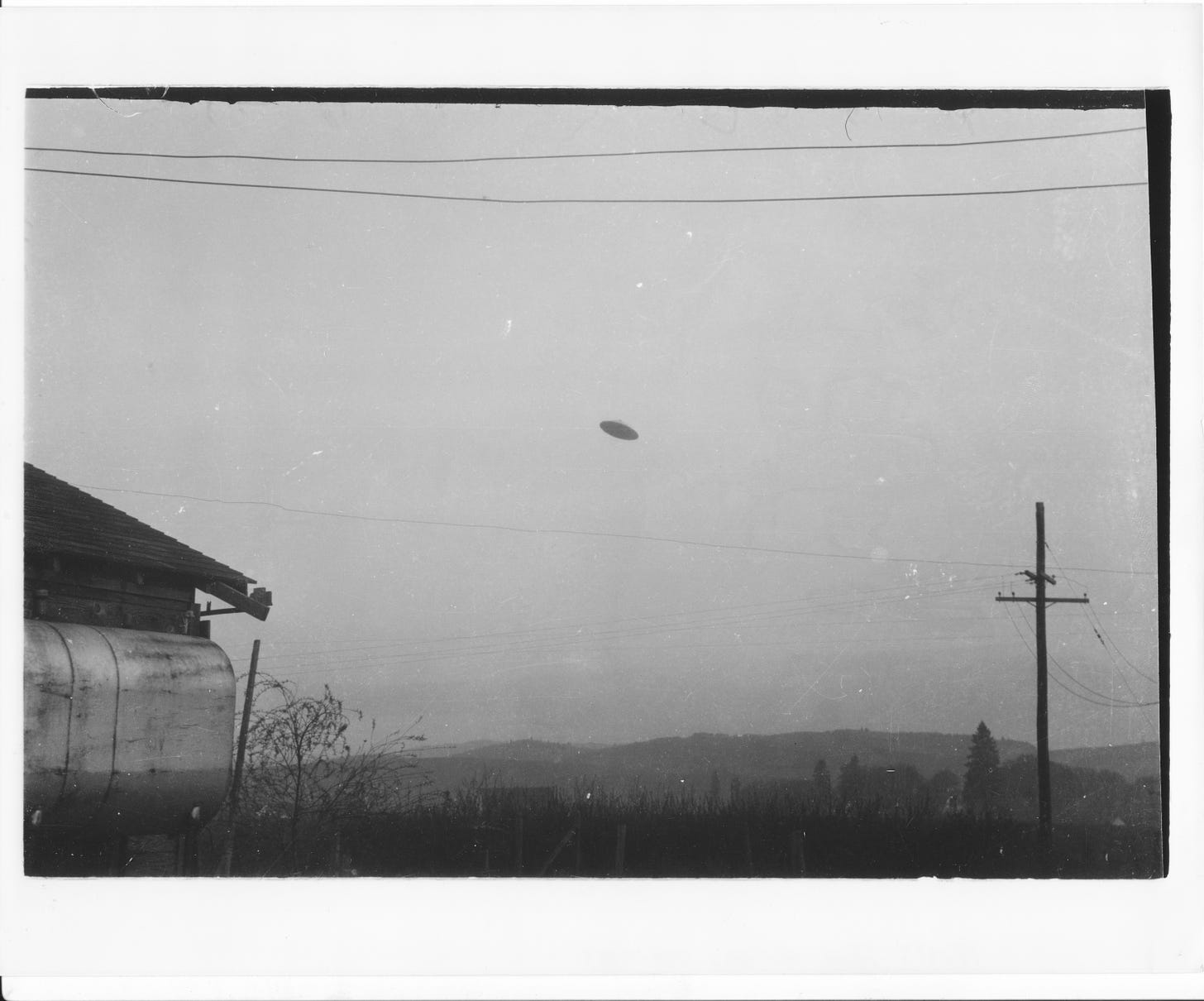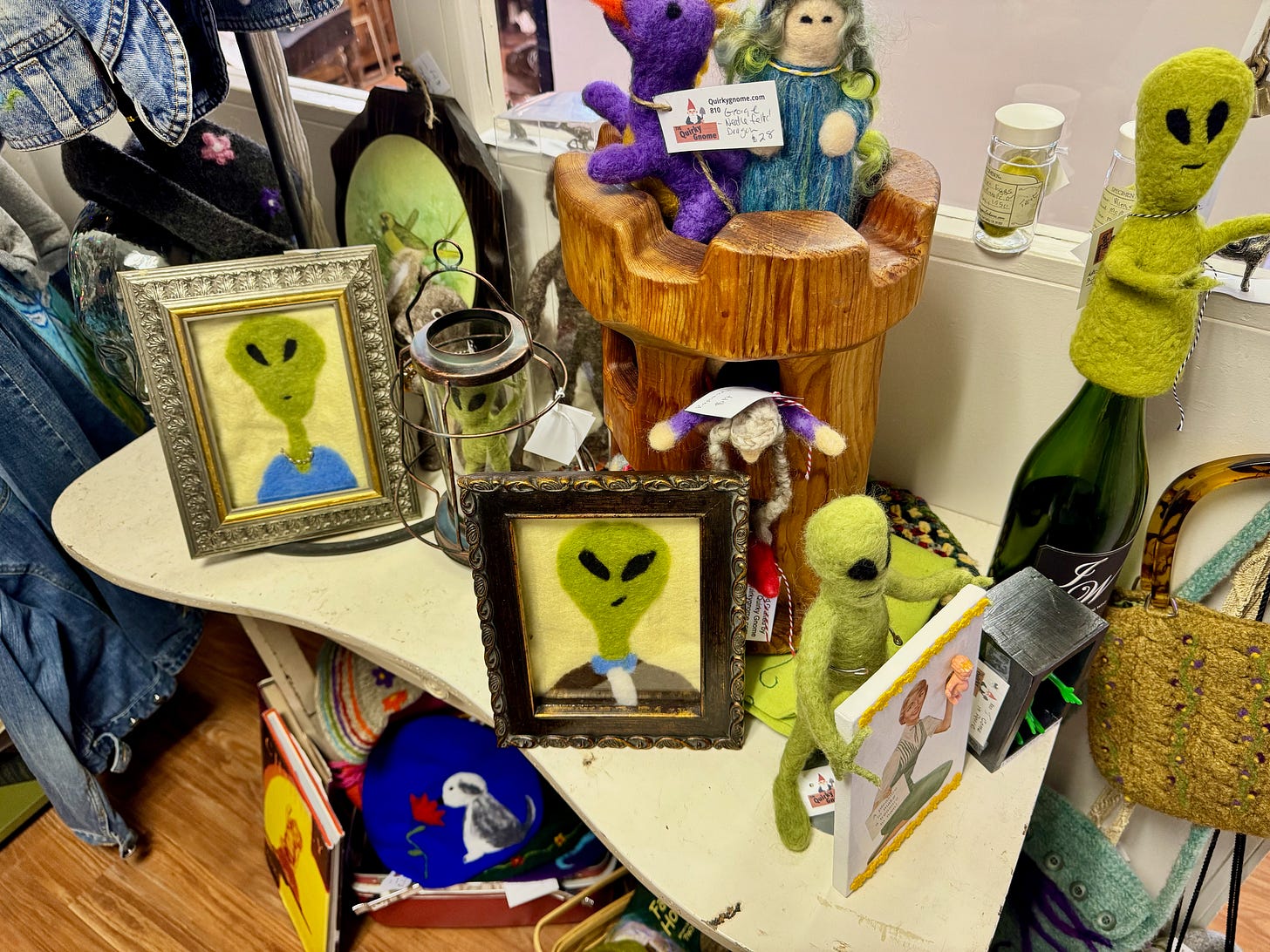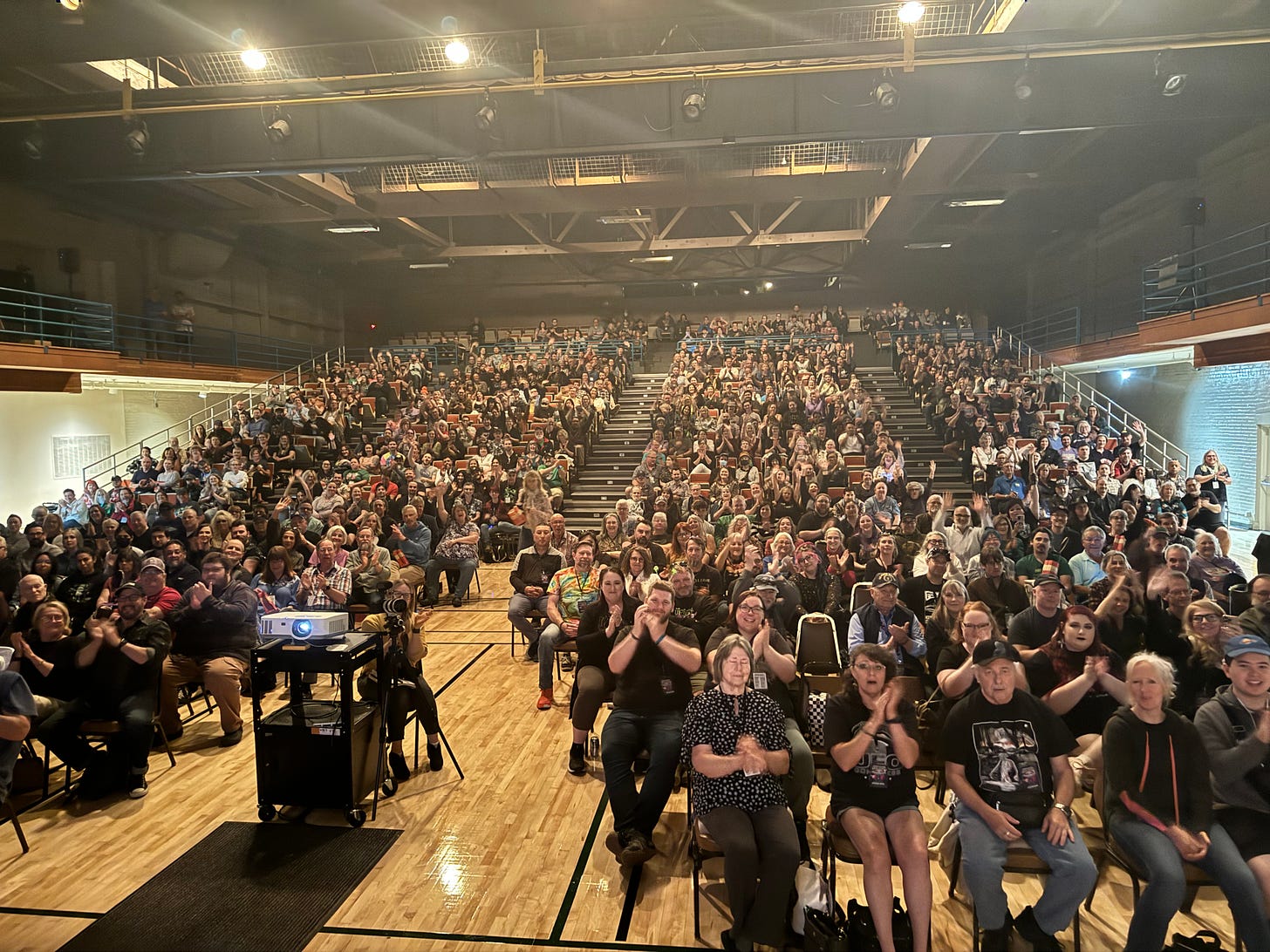As I walked into McMinnville, a town buzzing with excitement over the annual UFO festival, I couldn't shake the question: Would attending this event mark me as a 'true believer,' or could it help break down the stigma surrounding UAP discussions?
Background
In 1999, the McMenamins UFO Festival was established in McMinnville, Oregon, as a tribute to one of the most famous and credible UFO sightings in American history—the Trent UFO sighting. On March 11, 1950, farmers Paul and Evelyn Trent captured two photographs of a flying saucer-like object near their farm, just nine miles southwest of downtown McMinnville. These images quickly spread across the United States, featured in magazines and newspapers, and were hailed as the “best [flying saucer photos] yet in existence.”
The sighting occurred during a period when the country was captivated by reports of unidentified objects in the sky. The Trent photos stood out not only for their clarity but also for the credibility of the witnesses, who were simple, hardworking individuals with no apparent motive for fabrication.
Over the years, McMinnville has embraced this unique piece of its history, transforming the Trent sighting into a celebration of curiosity and the unknown. The McMenamins UFO Festival has grown into a major event, drawing tens of thousands of visitors who share an interest in UFOs, UAP, and the broader mysteries of our universe. This festival is more than just a good time; it’s an example of how a small town can engage with a global phenomenon.
As someone deeply invested in advancing the social acceptance of UAP topics, the festival presented both an opportunity and a challenge for me. Could I balance my professional objectivity with my personal curiosity? Would my participation hurt my credibility?
I elected to view the festival as a unique opportunity to challenge the stigma surrounding UAP discussions and foster a more open dialogue. Ultimately, David Fravor, the previous year’s headliner, called with the icing on the cake: “Just go. It’s an awesome town, the people are amazing, and you probably won’t have to buy a beer all weekend.” Dave knows how to pull my heart strings…
The Festival
For the unacquainted, McMinnville is a picturesque little town nestled amongst the rolling vineyards and lavender fields that make up much of the surrounding land. The tree-lined main street is well endowed with coffee shops, tasting rooms, and restaurants. At the center, both of the town and activity, is the McMenamins’ Hotel Oregon. Like all McMenamins hotels, this beautifully restored building is adorned with whimsical art that invites closer inspection at every turn. Bob, the historian in charge of the festival, explained to me that each property undergoes a carefully considered artistic transformation. For the UFO festival, the hotel was taken from its usual whimsy to an over-the-top UFO-themed extravaganza. In fact, the entire town got involved, with shops decorating their spaces with traditional UFO fare—knitted alien heads, hand-me-down clothes with all manner of quirky accoutrements that would make even Dr. Jacques Vallée blush.
The event was well-attended, drawing what seemed like tens of thousands of curious minds from as far away as Germany. From pets to people, everyone was dressed to impress with their homemade UFO-themed attire. Even Bob Lazar, infamous for revealing the existence of Area-51, was spotted strolling the streets of McMinnville. While many were reveling in the out-of-context, mind-shifting experience the festival represented (Portland loves being weird), many shared that this was a new adventure for them as well. The recent acceleration of the UAP topic in the news, among military personnel, and in the halls of Congress, has sparked an earnest curiosity in what many see as a paradigm-shifting conversation.
I had the privilege of speaking at the community center the evening after the festival kickoff. This was my opportunity to influence both debunkers and true believers. I recounted my experiences as a pilot, particularly what our squadron witnessed off the eastern seaboard in 2015. For the first time, I presented new data from pilots who have encountered UAPs during their professional careers.[Note: I’ll be writing a detailed article on what pilots have been reporting soon.] My goal was not just to share data but to illustrate how the UAP conversation can be framed within the context of national security and aerospace safety. I believe we were able have an effective conversation that conveyed the practical ramifications of unidentified objections operating within our airspace.
It was near the end of the presentation, during the Q&A session, when I was asked a fantastic question that made the whole trip worth it. A young man asked:
What advice do you have to help me discuss the topic of UFO/UAP with friends and family who may not be as interested?
This question perfectly encapsulated the challenge many face when trying to broach the subject with others, especially with those in positions of authority or those we hold in high regard. The emotions tied to speaking publicly about such experiences can be powerful, and the fear of rejection or ridicule can be suffocating. This question reinforced my belief that we can advance the social acceptance of UAP topics by empowering people how to effectively speak to others about this topic.
After countless conversations with the most ardent of believes and skeptics, I’ve learned two keys to success for a productive conversation about UAP.
Meet them where they are.
It’s a fair bet that whenever engaging someone on the topic of UAP, they are operating with a wildly different set of assumptions than you. Hey, it’s a complicated conversation, and people often approach it through the lens of their existing belief systems. People will only engage with this topic to a certain extent. If you force them beyond their comfort zone, the conversation quickly becomes unproductive. Listen to them, learn their boundaries, and respect those limits. Provide enough information to help them expand their understanding at their own pace.
Keep the conversation safe.
The concept of psychological safety is crucial in any discussion, especially about UAP. Psychological safety involves creating an environment where individuals feel comfortable expressing their thoughts and questions without fear of ridicule or rejection. But more than just creating a safe environment, the conversation must broach topics considered safe by the recipient. For instance, sharing that pilots are witnessing unexplained phenomena is one thing; suggesting the existence of biological remains of non-human intelligence is quite another. Crossing these invisible barriers without caution risks the entire conversation being dismissed.
Regardless of your convictions, meeting people where they are and ensuring the conversation feels safe for them is key to productive engagement. This means respecting their boundaries and providing information that allows them to expand their understanding at their own pace. An effective conversation offers enough insight to enable the recipient to reconsider their boundaries in their own time.
Understanding these two concepts unlocked my ability to productively engage people on the topic of UAP, whether they be personal friends or Representatives on Capitol Hill. By meeting people where they are in the conversation and providing them with enough information to motivate them to look deeper into the topic, you can engage productively with those who might otherwise be uncomfortable discussing UAP. I encourage you to keep these points in mind when discussing the UAP topic with those in your life. Good luck!
In the end…
While some may argue that events like this festival perpetuate UFO stigma, I believe they offer a rare opportunity for discussions that can shift perspectives and deepen the conversation. Attending the festival with the goal of improving discourse around UAP, I saw firsthand how open dialogue can foster understanding and acceptance. We stand on the brink of a paradigm shift in how these phenomena are perceived and discussed. Engaging those in your life in this conversation can be challenging, but by creating a safe space and meeting people where they are, we can encourage more productive and open-minded discussions. We all have a responsibility to foster this shift, making the understanding of UAP a respected and serious field of inquiry.
Ad finem,
Ryan Graves







